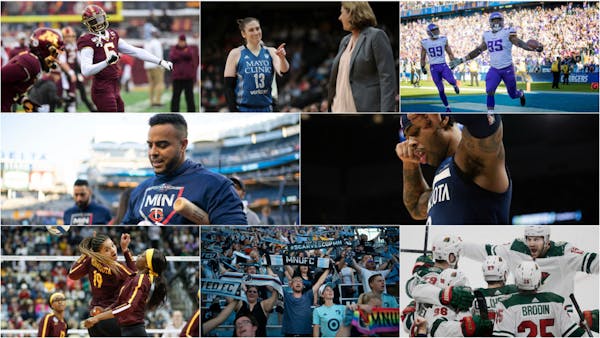 See
more of the story
See
more of the story
A dearth of games has left the sports world with a dearth of topical debates. Arguing about who will be the next pro to test positive is not quite as fun as arguing about the competition for Twins' rotation.
Minnesota is, though, at the center of one debate worth having, even if it is a debate with no real loser sparked by a television network construct.
The 2020 ESPY Awards ceremony, created by ESPN, was held last weekend and felt like a product of our times.
The show was hosted remotely, and by a black man and two gay female athletes who are proven social justice warriors and who wore shirts reading "Black Lives Matter.''
ESPN wisely and graciously decided to dedicate its 2020 awards to extraordinary acts of activism and humanitarianism.
The show became a testament not only to the willingness and ability of athletes and influential companies such as ESPN to be about more than sports, but also to the sizable hearts of so many Twin Cities athletes.
Former Timberwolves star Kevin Love received the Arthur Ashe Courage Award for his attempts to destigmatize depression and other mental health issues.
Mesabi Range college running back Taquarius Wair, who lost the fingers on his left hand during a fire when he was 4, received the Jimmy V Award for perseverance.
Love, Twins slugger Nelson Cruz and Lynx star Maya Moore were finalists for the Muhammad Ali Sports Humanitarian Award.
As is the case with most highly coveted awards, the runners-up are all deserving.
Cruz was given the award, and he is deserving, having done so much good in the Dominican Republic and his summer home of the United States.
Here's where we could have a debate more meaningful than "How much money should Dalvin Cook be paid?"
I would argue that Moore was even more deserving of the award than Cruz.
They are both admirable athletes. Cruz was the key figure, and perhaps the key player, on a Twins team that jumped from 78 to 101 victories in one season. He anchored a lineup that set a big-league record for home runs.
He mentored Miguel Sano, who performed like a most valuable player in the second half of the season and perhaps saved his career.
He taught a still-young team about professionalism and grace. And while the award highlighted Cruz's good works in the Dominican Republic, he also routinely spent his free time in the Twin Cities doing good.
How does Cruz compare to Moore in terms of charitable work and social activism?
This is where the debate truly begins.
I don't know that anybody compares with Moore.
Moore ranks as one of the best high school and college basketball players ever. As the WNBA's No. 1 pick in 2011, she helped a Lynx franchise that had never won a playoff series win the WNBA title as a rookie.
In her first seven seasons as a pro, she helped the Lynx win four titles, reach two other WNBA Finals and reach one other conference finals.
She was on her way to becoming one of the winningest athletes in American sports history, and may have positioned herself as one of the greatest players in WNBA history.
Then she quit. In her prime. Not to try out another sport or to avoid scrutiny, but to dedicate herself full-time to criminal justice reform.
She and her team helped Jonathan Irons get what she believes is a wrongful conviction overturned. The Missouri attorney general is appealing the decision. Irons spent 23 years of a 50-year sentence behind bars, in maximum security, despite what Moore, a native of Jefferson City, Mo., believes was a lack of tangible evidence.
Moore faced off with a judicial and for-profit penal system weighted against people of color. She fought the law and, against all odds, she won.
Cruz is a wonderful human being deserving of many awards and accolades.
When it came to the foremost award at the 2020 ESPYs, nobody should have finished ahead of the great and good Maya Moore.
Jim Souhan's podcast can be heard at TalkNorth.com. On Twitter: @SouhanStrib. • jsouhan@startribune.com




![Minnesota Twins pitcher Jhoan Duran (59) in the ninth inning Tuesday, August 15, 2023, Target Field in Minneapolis, Minn. ] CARLOS GONZALEZ • carlos](https://arc.stimg.co/startribunemedia/NWLT5CNXGTRZA6KVTMIPSOG3KI.jpg?w=75&h=75&fit=crop&crop=faces)

